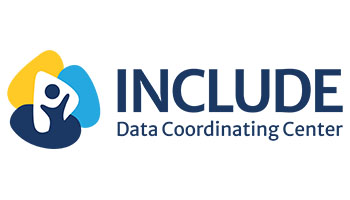HOW CAN WE HELP YOU? Call 1-800-TRY-CHOP
In This Section
Adam Resnick, PhD, Co-leads New Data Coordinating Center for Down Syndrome Research

The goal of the new INCLUDE DCC is to accelerate discoveries and advance medical care to improve the lives of people with Down syndrome.
mccannn [at] chop.edu (By Nancy McCann)
Accelerating discoveries and advancing medical care to improve the lives of individuals with Down syndrome is the goal of a new data coordinating center (DCC) that is part of the National Institutes of Health INvestigation of Co-occurring conditions across the Lifespan to Understand Down syndromeE (INCLUDE) Project. Its leaders plan to achieve such a herculean objective by creating a world-class resource for data sharing, data access, and integrative analysis in Down syndrome.
The INCLUDE DCC will empower scientists, physicians, and the community with tools to elicit evidence-based action in the laboratory, clinic, classroom, government, and society at-large. It’s meant to serve the research community and also provide resources to improve life for patients and families.

Supported by a five-year, $19.5 million grant from the INCLUDE Project — a trans-NIH research initiative focused on critical health and quality-of-life needs for individuals with Down syndrome — the Center for Data Driven Discovery in Biomedicine (D3b) at Children’s Hospital of Philadelphia will partner with Sage Bionetworks and the Linda Crnic Institute for Down Syndrome at the University of Colorado Anschutz Medical Campus to develop the DCC.
“More and more, the scientific community is demonstrating the power of platforms to connect different communities with diverse areas of expertise and datasets to drive surprising discoveries and accelerated impact across a broad number of conditions in both children and adults,” said Co-lead of the INCLUDE DCC Adam Resnick, PhD. “The DCC Project will build on these efforts through the implementation of new technologies and platforms that will empower large-scale, diverse INCLUDE datasets on behalf of individuals with Down syndrome and other associated medical conditions and diseases.”

Adam Resnick, PhD, co-leader of the new INCLUDE Data Coordinating Center
Down Syndrome and Co-occurring Medical Conditions
More than six million individuals living with Down syndrome have an increased risk of developing a wide range of medical conditions, such as hearing loss, Alzheimer’s disease, sleep apnea, and COVID-19. Unlike the general public, they rarely develop solid tumors such as breast and prostate cancers and certain heart disease. Understanding the biology of this unique combination of risk and resiliencies in individuals with Down syndrome is one of the main goals of the INCLUDE Project. By providing an accessible and centralized data resource, the INCLUDE DCC will enable collaborative analyses across institutions and researchers around the globe, which then could lead to cross-disease discovery.
“We’re both connecting existing research efforts across the Down syndrome community as well as supporting new data-driven initiatives and resources through new platforms that bring together researchers, clinicians, advocates, and other community stakeholders.” Dr. Resnick said. “Our mission is to accelerate discoveries that continuously improve and enrich the lives of people with Down syndrome through accessible data resources that empower interdisciplinary collaboration, connected communities, and the expansion of a global Down syndrome knowledge ecosystem.”
Three Cores
The INCLUDE DCC is divided into three specialized yet overlapping cores: data portal, data management, and administration and outreach; each based at one of the three partner organizations. The Data Management Core, led by Justin Guinney, PhD, vice president of Computational Oncology at Sage Bionetworks, manages the collection, processing, and harmonization of the data. The Administrative and Outreach Core, led by Joaquin Espinosa, PhD, executive director of the Linda Crnic Institute for Down Syndrome, handles project management and outreach, communications, and education.
The Data Portal Core is based at CHOP and led by Dr. Resnick, who is also director of CHOP’s D3b. The team will work closely with CHOP’s own Trisomy 21 Program and its director Mary Pipan, MD, and they plan to build a centralized portal that will enable researchers and the community to interact with cohorts and datasets that correlate with Down syndrome studies for data sharing and analysis.
“It’s important that new portal technologies are harnessed to understand how to better understand the many physiologic and neurodevelopmental complexities of individuals with Down syndrome, as well as to explore the genetic mechanisms of these complexities,” Dr. Pipan said.
Key innovations in the successful development of the portal will be creating entry points where clinicians, clinical and basic science researchers, and data scientists can input data from completed or ongoing studies, and to work with D3b professionals on projects to collect meaningful data, Dr. Pipan added. D3b will also provide a forum for clinicians, researchers, and community stakeholders to partner and collaborate on using the D3b data to develop meaningful questions for next steps in research, with the ultimate goal of improving the lives of patients with Down syndrome.
The D3b team is expert at empowering large-scale molecular and phenotypic data for discovery, using cloud-based platforms that rapidly transform data from its raw state into a useable and quarriable state for researchers. The INCLUDE DCC project builds on the team’s experiences with the NIH Common Fund-supported Gabriella Miller Kids First Data Research Center, a collaborative effort led by CHOP’s D3b along with other institutional partners to understand the genetic causes and links between childhood cancer and structural birth defects. Its research portal makes large-scale data on childhood cancer and birth defects available to researchers, clinicians, and patients within a cloud-based environment, enabling users around the globe to work together to accelerate research and promote new discoveries.
Getting Started
The INCLUDE DCC team will identify all existing Down syndrome cohorts and data already established by researchers, engage in “listening tours” to understand the needs of the research and Down syndrome communities, and develop frameworks for data governance, standardization, and management. The team plans to release the first version of the public data portal in late 2022, while continuing to refine and expand the platform thereafter. They aim to continuously innovate on the empowered large-scale, diverse INCLUDE datasets and new data platform analytics on behalf of individuals with Down syndrome and other associated medical conditions and diseases.
“We hope these data coordinating efforts and platform not merely create an aggregation of data, but instead support whole ecosystems for communities committed to real-time discovery in proximity to the clinical interface,” Dr. Resnick said.